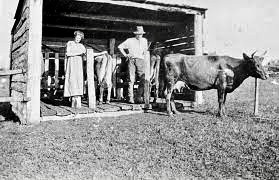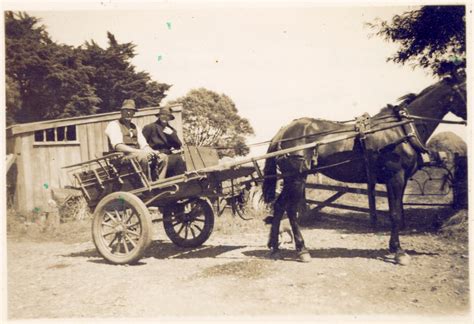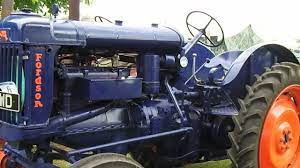|
In the 1920s, after World War One finished, returned
soldiers were given blocks of rough bushland to convert to
grassland. It was a tough and lonely life for those who had
gone to war as teenagers, then worked in isolated and lonely
conditions in their 20s.
They developed very few social skills as they cut down trees and manuka scrub, burnt it off, sowed grass seed, ran a few dairy cows, milked them by hand, and took the milk on a dray to a cheese factory several miles away.
1. Cow Cocky, a term with Australian origins. Cocky was short for cockatoo, a name for a small dairy farmer who had earlier been a convict. 2. Baching - living alone as a bachelor. 3. Porkers - half-grown pigs, suitable for killing and turning into pork. 4. Finished milking - slowly, by hand in primitive muddy cow sheds!  5. Buggy - this would have been a light 2-wheeled vehicle pulled by one horse. By the mid-1920s,
rubber-tyred wheels from motor cars were replacing the
iron-rimmed wheels of 19th-century carriages.
 7. Gurie - dialect Maori pronuciation of Kuri = dog, which was developed from the English word "Collie."
8. To cut out - to separate a single farm animal from its protective herd. 9. The Missus talks at night. When the farmer came in at night, exhausted, his equally exhausted
wife would constantly talk
of all the problems she had faced that day. 10. Tea-tree was manuka scrub, which grows quickly after a mature forest is felled and burnt.
Captain James Cook noticed indigenous Australians making a
drink from the plant’s leaves. He drank a tea-like infusion
made from the leaves, liked it, and started calling the plant
a “Tea Tree”. In New Zealand he used it to prevent scurvy,
although there is no modern evidence that it was effective, as
scurvy is caused by Vitamin C deficiency.
11. His tractor. Before WW2, only big NZ farmers could afford to buy 4 litre Fordson Major farm
tractors.
 After WW2
Harry Fegusson introduced the smaller, quieter, cheaper 1.8
litre Fergusson
tractor, with a low, wide design, and a top gear that
enabled it to be used as a road vehicle.
"My little grey Fergie" became universally popular with small farmers.  it originated from the Irish
convicts' Gaelic word "sheila" = "girl."
13. Grouse,
meaning 'very satisfactory, excellent' was borrowed fromA sheila is now an iconic Aussie woman: strong, resilient, independent, and with a dash of cheekiness. Australia. The Aussies seem to
have got it from Ulster's groosh = 'excellent',
which came in turn from the Scottish word grush, =
'thriving, healthy.'
13.
Yuv gotta gedda is New Zealand rural dialect for "You
have got to get a..." (He's guntuh/gunnuh = He is going to) This
clipped speech with many vowels reduced to "uh" and with final
consonants omitted was first brought to notice in Barry Crump's
book "A Good Keen Man." G'day; howyuh gun ma'? (Good
day; how are you getting on, mate?) We slipped into it when we
landed, very tired, at Dallas airport at midnight, and nobody
could understand us.
15. Ute - from the early 1950s on, the stylish Australian-made rear-wheel drive Ford and Holden utes (utility vehicles) were Aussie icons, until the 1980s, when the Toyota Hilux and other 4-wheel-drive vehicles demonstrated more macho brute strength and even greater utility.  Recordings 1962 Peter Cape, You Can't Win EP 1964 Phil Garland, Live in Concert at ChCh Folk Centre 1975 Peter Cape, Kiwi Ballads LP 1978 Graham Wilson, Gisborne Folk Festival cass 1980 Frank Fyfe in concert cass 1982 Graham Wilson, Billy on the Boil LP 1983 Martin Curtis, Gin and Raspberry LP cass 1996 Gumboot Tango, Rattle Your Dags cass 1986 Homestead in NZ compilation cass "..on Alan Scott's latest CD (Australia), I think" (David De Santi) 2001 I'm An Ordinary Joker CD 2014 Sled, A Kiwi Sings CD Similar songs My Man's Gone Now - Rainbird in the Teatree - All My Love is Gone - Stable Lad - By the Dry Cardrona - Black Matai - Invercargill - Hamilton - Mihiwaka - Puketapu - Taumarunui
This webpage put onto
folksong.org.nz website in March 2024 |